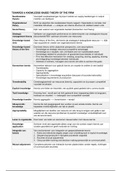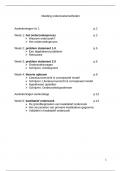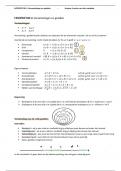Qualitative research practice Summary studybook
Chapter 1: The foundations of qualitative research
There is no single, accepted way of carrying out qualitative research.
Qualitative research is often described as a naturalistic, interpretative approach, concerned with
exploring from the interior and taking the perspectives and accounts of research participants as a
starting point.
Qualitative research is often distinguished by the fact that hypotheses are commonly generated
from analysis of the data than stated at the outset.
Despite the wide variation in approaches to qualitative research practice there are many key
elements that are commonly identified as giving qualitative research its distinctive character.
However, it should be recognised that a comprehensive definition of qualitative research is difficult
to attain, because of the wide array of approaches and beliefs it encompasses.
Common Characteristics of Qualitative research:
Aims and objectives that are directed at providing an in-depth and interpreted
understanding of the social world of research participants by learning about the sense they
make of their social and material circumstances, their experiences, perspectives and
histories.
The use of non-standardised, adaptable methods of data generations that are sensitive to
the social context of the study and can be adapted for each participant or case to allow the
exploration of emergent issues
Data that are detailed, rich and complex (again, the precise depth and complexity of data
may vary between studies)
Openness to emergent categories and theories at the analysis and interpretation stage
Outputs that include detailed descriptions of the phenomena being researched, grounded in
the perspectives and accounts of participants
A reflexive approach, where the role and perspective of the researcher in the research
process is acknowledge. For some researchers, reflexivity also means reporting their
personal experiences in the field.
Issues of how the social world works has two main directions; ontology and epistemology
Ontology
Ontology is concerned with the nature of reality and what there is to know about the world. Key
ontological questions concern whether or not there is a social reality that exists independently of
human conceptions and interpretations and closely related to this whether there is a shared social
reality or only multiple, context-specific ones.
In very broad terms, social science has been shaped by two overarching ontological positions in
relationship to these issues – realism and idealism. Realism is based on the idea that there is an
external reality which exists independently or people’s beliefs about or understanding of it. In other
words there is a distinction between the way the world is, and the meaning and interpretation of
that world held by individuals.
Idealism, on the other hand, asserts that reality is fundamental mind-dependent: it is only
knowable through the human mind an through socially constructed meanings, and no reality exists
independently of these.
Examples of ontological questions:
What is the nature of the (social) entities?
Does social reality exist independently of human conceptions and interpretations?
Is there a common, shared, social reality or just multiple context-specific realities?
Is social reality independent of human actors or is it constantly being constructed by them?
,Epistemology
Epistemology is concerned with ways of knowing and learning about the world and focuses on
issues such as how can we learn about reality and what forms the basis of our knowledge. Several
key issues dominate epistemological debates in social research. The first of these relates to the
way in which knowledge is best acquired.
Examples of epistemological questions:
How is it possible to know about the world?
What constitutes valid knowledge about the world?
It is okay to use methods of the natural sciences for the study of human behaviour?
Inductive processes involve using evidence as the genesis of a conclusion. Evidence is collected
first, and knowledge and theories built from this
Deductive processes Uses evidence in support of a conclusion. Hypothesis is first developed and
evidence if then collected to confirm or reject it.
Retroduction the researcher seeks to devise a possible explanation for patterns in the data and
identify the structures or mechanisms that might have produced them, trying out different models
for ‘fit’.
Abduction a research strategy unique to qualitative inquiry. Everyday activities, ideas or beliefs
are described using participants language and meanings (first- order concept). A technical account
is then abducted from the lay accounts using the researchers categories (second – order concept).
** Involving abducting a technical account using the researchers categories from participants own
accounts of everyday activities, ideas or beliefs.
The second key epistemological issue within social research concerns the relationship between the
researcher and the researched and how this influences the connection as independent of and
unaffected by the behaviour of the researcher.
The third set of epistemological issue relating to social research focus on what it means to accept
particular claims as accurate or true.
Positivism
Knowledge is produced through the senses based on careful observation
Regularities and constant conjunctions are identified
Inductive reasoning is used after data have been collected to generalise from empirical
instances to general laws
Reality is unaffected by the research process, facts and values are separate objectives
value-free inquiry is possible
The methods used in the nature sciences are appropriate for studying the social world
Reality can be know accurately (knowledge is foundational, correspondence theory of truth)
Key figures in empiricism/ positivism
Rene Descartes, key idea; researchers should distance themselves from influences
Isaac Newton & Fransic Bacon; asserted that knowledge around the world can be acquired
through observation
Post-positivism
Knowledge of the world is produced through testing propositions: hypotheses about causal
relationship are derived from scientific theories and then evaluated empirically against
observations
Deductive reasoning is used to populate possible relationships and models before data are
collected
The methods used in the natural sciences are appropriate for studying the social world
Reality can be know approximately, hypotheses can be rejected or provisionally confirmed,
but no definitively proved to be true (knowledge is provisional and fallibilistic, coherence
, theory of truth. (fallibilistic = al onze kennis is feilbare kennis en zal daarom altijd
betwijfeld kunnen worden).
Interpretivism
Claims that natural science methods are not appropriate for social investigation because the social
world is not governed by regularities that hold law-like properties. Hence, a social researcher has
to explore and understand the social world through the participants and their own perspectives and
explanations can only be offered at the level of meaning rather than cause.
** Knowledge is produced by exploring and understanding the social world of the people being
studied, focusing on their meanings and interpretations
** The research process is considered to be largely inductive in the sense that interpretation is
grounded in the data.
Key figures in interpretivism (Max Weber)
- Non positivist methods for studying social world
- Interpreting people’s understanding of social world (Verstehen)
- Observation
> Investigators values matter
Constructionism
Emphasis that knowledge is actively constructed by human beings, rather than being passively
received by them. This approach reject the idea of value neutral observations and universal laws
and focus of understanding lived experience from the points of view of those who hold it.
Ethnography involves understanding the social world or culture – the shared behaviours beliefs
and values- of particular groups, typically via immersion in their community
Participatory (action) research which aims to break down the barriers between the researcher
and the researched and to enact positive change for those involved in the research process.
Pragmatism choosing an approach that best fits the specific research question.
There are two key aspects of the context in which the use of qualitative methods within social
policy has developed which it is useful to understand. A primary factor is that much of the research
ins commissioned and funded by public bodies (central government departments being far the
largest spenders) and intended to support or be used in the design, development and appraisal of
policy and practise.
Chapter 2: The applications of Qualitative Methods to Social Research
Theoretical research concerned with the aim of testing, generating or enhancing thinking within a
particular discipline. Basic researchers work to generate new theories or existing theories
Applied research concerned with using the knowledge acquired through research to contribute
directly to the understanding or resolution of a contemporary issue. As such, its objectives are
usually set or shaped by specific information requirements or by the need to gain insight into an
existing problem. Applied social research is often equated with social policy research which has the
objectives of developing, monitoring or evaluating policy and its related practise.
In applied research the policy making cycle is sometimes used to define the different types of
research needed during the key stages of policy making that is is;
Formulation where research to understand a social problem and/or generate ideas for a
policy or programme is required
Implementation where research focuses on the process of implementing a policy and the
barriers and facilitators to doing so effectively
Appraisal which concerned with assessing impacts
From these and other such definitions, it is possible to identify a broad, although comprehensive,
classification of the potential functions of social research as follows;
1. Contextual; describing the form or nature of what exists
, Contextual research concerned with identify what exists in the social world and the way it
manifest itself.
A major feature of qualitative methods is their facility to describe and display phenomena as
experienced by the study population in fine-tuned detail and in the study participants own terms.
IT therefore offers the opportunity to unpack issues, to see what they are about or what lies inside,
and to explore how they are understood by those connected with them. Such evidence can be used
to: display the nature or features of a phenomenon, identify and define typologies, models and
groups.
These functions of qualitative research have been called descriptive or exploratory by other authors
and indeed both description and exploration are key features of contextual research.
2. Explanatory; examining the reasons for, or associations, between, what exists
Explanatory research concerned with why phenomena occur and the forces and influence that
drive their occurrence. This kind of research provides a unique tool for studying what lies behind or
underpins, a decision attitude, behaviour or other phenomena. It makes it possible to identify: the
motivations that lead to decisions, actions or non-actions, the origins or formation of events,
experiences or occurrences.
3. Evaluative; appraising the effectiveness of what exists
Evaluative research concerned with how well thing work, an issue that is central to much policy-
related and organisational investigation. To carry out evaluation, information is needed about both
processes and outcomes and qualitative research contributes to both.
One of the most widely used distinctions in evaluation is between formative and summative modes
of evaluation. Formative evaluations are designed to provide information that will help to change or
improve a programme/systems and its delivery or organisational effectiveness. Summative
valuation is concerned with the impact of an intervention, programme or policy in terms of
effectiveness and the different outcomes that have resulted.
4. Generative; aiding the development of theories, strategies or actions
Generative research concerned with producing new ideas as a contribution either the
development of social theory or to the refinement or stimulus of policy solutions.
Qualitative research seeks to capture emergent concepts and because it coverage is not overly
prescriptive, the potential for original or creative thoughts or suggestions to emerge is high. It
therefore has the potential to: develop new conceptions or understandings of social phenomena,
generate new solutions to persistent social problems
Participatory Action Research (PAR) particular approach to generating new contributions to social
and political debate which builds on the idea that participants are experts on their own lives.
Qualitative research as an independent research strategy
In many occasions the qualitative approach will be the only approach needed to address a research
question. A number of authors have identified the kind of circumstances in which this might be so
There are also factors, primarily related to the subject matter under investigation that may
necessitate the sole use of qualitative inquiry, at least in first instance. These arise when the
phenomena being studied hold certain features;
- Ill defined/ not well understood ( when the subject matter needs to be more clearly understood or
– Deeply rooted
- Complex
- Specialist
- Delicate or intangible (ontastbaar)
- Sensitive
The features described above are some of the main determinants of using qualitative research as
an independent mode of research inquiry. In all cases they are the kinds of subject matter that are
Chapter 1: The foundations of qualitative research
There is no single, accepted way of carrying out qualitative research.
Qualitative research is often described as a naturalistic, interpretative approach, concerned with
exploring from the interior and taking the perspectives and accounts of research participants as a
starting point.
Qualitative research is often distinguished by the fact that hypotheses are commonly generated
from analysis of the data than stated at the outset.
Despite the wide variation in approaches to qualitative research practice there are many key
elements that are commonly identified as giving qualitative research its distinctive character.
However, it should be recognised that a comprehensive definition of qualitative research is difficult
to attain, because of the wide array of approaches and beliefs it encompasses.
Common Characteristics of Qualitative research:
Aims and objectives that are directed at providing an in-depth and interpreted
understanding of the social world of research participants by learning about the sense they
make of their social and material circumstances, their experiences, perspectives and
histories.
The use of non-standardised, adaptable methods of data generations that are sensitive to
the social context of the study and can be adapted for each participant or case to allow the
exploration of emergent issues
Data that are detailed, rich and complex (again, the precise depth and complexity of data
may vary between studies)
Openness to emergent categories and theories at the analysis and interpretation stage
Outputs that include detailed descriptions of the phenomena being researched, grounded in
the perspectives and accounts of participants
A reflexive approach, where the role and perspective of the researcher in the research
process is acknowledge. For some researchers, reflexivity also means reporting their
personal experiences in the field.
Issues of how the social world works has two main directions; ontology and epistemology
Ontology
Ontology is concerned with the nature of reality and what there is to know about the world. Key
ontological questions concern whether or not there is a social reality that exists independently of
human conceptions and interpretations and closely related to this whether there is a shared social
reality or only multiple, context-specific ones.
In very broad terms, social science has been shaped by two overarching ontological positions in
relationship to these issues – realism and idealism. Realism is based on the idea that there is an
external reality which exists independently or people’s beliefs about or understanding of it. In other
words there is a distinction between the way the world is, and the meaning and interpretation of
that world held by individuals.
Idealism, on the other hand, asserts that reality is fundamental mind-dependent: it is only
knowable through the human mind an through socially constructed meanings, and no reality exists
independently of these.
Examples of ontological questions:
What is the nature of the (social) entities?
Does social reality exist independently of human conceptions and interpretations?
Is there a common, shared, social reality or just multiple context-specific realities?
Is social reality independent of human actors or is it constantly being constructed by them?
,Epistemology
Epistemology is concerned with ways of knowing and learning about the world and focuses on
issues such as how can we learn about reality and what forms the basis of our knowledge. Several
key issues dominate epistemological debates in social research. The first of these relates to the
way in which knowledge is best acquired.
Examples of epistemological questions:
How is it possible to know about the world?
What constitutes valid knowledge about the world?
It is okay to use methods of the natural sciences for the study of human behaviour?
Inductive processes involve using evidence as the genesis of a conclusion. Evidence is collected
first, and knowledge and theories built from this
Deductive processes Uses evidence in support of a conclusion. Hypothesis is first developed and
evidence if then collected to confirm or reject it.
Retroduction the researcher seeks to devise a possible explanation for patterns in the data and
identify the structures or mechanisms that might have produced them, trying out different models
for ‘fit’.
Abduction a research strategy unique to qualitative inquiry. Everyday activities, ideas or beliefs
are described using participants language and meanings (first- order concept). A technical account
is then abducted from the lay accounts using the researchers categories (second – order concept).
** Involving abducting a technical account using the researchers categories from participants own
accounts of everyday activities, ideas or beliefs.
The second key epistemological issue within social research concerns the relationship between the
researcher and the researched and how this influences the connection as independent of and
unaffected by the behaviour of the researcher.
The third set of epistemological issue relating to social research focus on what it means to accept
particular claims as accurate or true.
Positivism
Knowledge is produced through the senses based on careful observation
Regularities and constant conjunctions are identified
Inductive reasoning is used after data have been collected to generalise from empirical
instances to general laws
Reality is unaffected by the research process, facts and values are separate objectives
value-free inquiry is possible
The methods used in the nature sciences are appropriate for studying the social world
Reality can be know accurately (knowledge is foundational, correspondence theory of truth)
Key figures in empiricism/ positivism
Rene Descartes, key idea; researchers should distance themselves from influences
Isaac Newton & Fransic Bacon; asserted that knowledge around the world can be acquired
through observation
Post-positivism
Knowledge of the world is produced through testing propositions: hypotheses about causal
relationship are derived from scientific theories and then evaluated empirically against
observations
Deductive reasoning is used to populate possible relationships and models before data are
collected
The methods used in the natural sciences are appropriate for studying the social world
Reality can be know approximately, hypotheses can be rejected or provisionally confirmed,
but no definitively proved to be true (knowledge is provisional and fallibilistic, coherence
, theory of truth. (fallibilistic = al onze kennis is feilbare kennis en zal daarom altijd
betwijfeld kunnen worden).
Interpretivism
Claims that natural science methods are not appropriate for social investigation because the social
world is not governed by regularities that hold law-like properties. Hence, a social researcher has
to explore and understand the social world through the participants and their own perspectives and
explanations can only be offered at the level of meaning rather than cause.
** Knowledge is produced by exploring and understanding the social world of the people being
studied, focusing on their meanings and interpretations
** The research process is considered to be largely inductive in the sense that interpretation is
grounded in the data.
Key figures in interpretivism (Max Weber)
- Non positivist methods for studying social world
- Interpreting people’s understanding of social world (Verstehen)
- Observation
> Investigators values matter
Constructionism
Emphasis that knowledge is actively constructed by human beings, rather than being passively
received by them. This approach reject the idea of value neutral observations and universal laws
and focus of understanding lived experience from the points of view of those who hold it.
Ethnography involves understanding the social world or culture – the shared behaviours beliefs
and values- of particular groups, typically via immersion in their community
Participatory (action) research which aims to break down the barriers between the researcher
and the researched and to enact positive change for those involved in the research process.
Pragmatism choosing an approach that best fits the specific research question.
There are two key aspects of the context in which the use of qualitative methods within social
policy has developed which it is useful to understand. A primary factor is that much of the research
ins commissioned and funded by public bodies (central government departments being far the
largest spenders) and intended to support or be used in the design, development and appraisal of
policy and practise.
Chapter 2: The applications of Qualitative Methods to Social Research
Theoretical research concerned with the aim of testing, generating or enhancing thinking within a
particular discipline. Basic researchers work to generate new theories or existing theories
Applied research concerned with using the knowledge acquired through research to contribute
directly to the understanding or resolution of a contemporary issue. As such, its objectives are
usually set or shaped by specific information requirements or by the need to gain insight into an
existing problem. Applied social research is often equated with social policy research which has the
objectives of developing, monitoring or evaluating policy and its related practise.
In applied research the policy making cycle is sometimes used to define the different types of
research needed during the key stages of policy making that is is;
Formulation where research to understand a social problem and/or generate ideas for a
policy or programme is required
Implementation where research focuses on the process of implementing a policy and the
barriers and facilitators to doing so effectively
Appraisal which concerned with assessing impacts
From these and other such definitions, it is possible to identify a broad, although comprehensive,
classification of the potential functions of social research as follows;
1. Contextual; describing the form or nature of what exists
, Contextual research concerned with identify what exists in the social world and the way it
manifest itself.
A major feature of qualitative methods is their facility to describe and display phenomena as
experienced by the study population in fine-tuned detail and in the study participants own terms.
IT therefore offers the opportunity to unpack issues, to see what they are about or what lies inside,
and to explore how they are understood by those connected with them. Such evidence can be used
to: display the nature or features of a phenomenon, identify and define typologies, models and
groups.
These functions of qualitative research have been called descriptive or exploratory by other authors
and indeed both description and exploration are key features of contextual research.
2. Explanatory; examining the reasons for, or associations, between, what exists
Explanatory research concerned with why phenomena occur and the forces and influence that
drive their occurrence. This kind of research provides a unique tool for studying what lies behind or
underpins, a decision attitude, behaviour or other phenomena. It makes it possible to identify: the
motivations that lead to decisions, actions or non-actions, the origins or formation of events,
experiences or occurrences.
3. Evaluative; appraising the effectiveness of what exists
Evaluative research concerned with how well thing work, an issue that is central to much policy-
related and organisational investigation. To carry out evaluation, information is needed about both
processes and outcomes and qualitative research contributes to both.
One of the most widely used distinctions in evaluation is between formative and summative modes
of evaluation. Formative evaluations are designed to provide information that will help to change or
improve a programme/systems and its delivery or organisational effectiveness. Summative
valuation is concerned with the impact of an intervention, programme or policy in terms of
effectiveness and the different outcomes that have resulted.
4. Generative; aiding the development of theories, strategies or actions
Generative research concerned with producing new ideas as a contribution either the
development of social theory or to the refinement or stimulus of policy solutions.
Qualitative research seeks to capture emergent concepts and because it coverage is not overly
prescriptive, the potential for original or creative thoughts or suggestions to emerge is high. It
therefore has the potential to: develop new conceptions or understandings of social phenomena,
generate new solutions to persistent social problems
Participatory Action Research (PAR) particular approach to generating new contributions to social
and political debate which builds on the idea that participants are experts on their own lives.
Qualitative research as an independent research strategy
In many occasions the qualitative approach will be the only approach needed to address a research
question. A number of authors have identified the kind of circumstances in which this might be so
There are also factors, primarily related to the subject matter under investigation that may
necessitate the sole use of qualitative inquiry, at least in first instance. These arise when the
phenomena being studied hold certain features;
- Ill defined/ not well understood ( when the subject matter needs to be more clearly understood or
– Deeply rooted
- Complex
- Specialist
- Delicate or intangible (ontastbaar)
- Sensitive
The features described above are some of the main determinants of using qualitative research as
an independent mode of research inquiry. In all cases they are the kinds of subject matter that are












